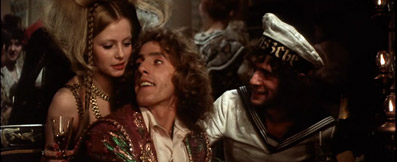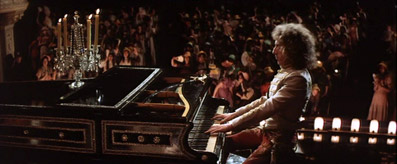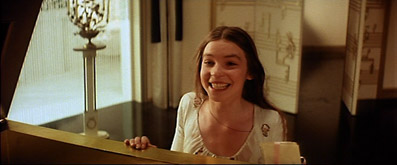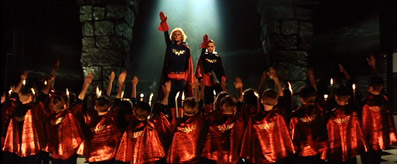|
It all starts with a ticking metronome. Now if you're a classical music devotee and you've come to see a respectful biography of the celebrated 19th Century composer Franz Liszt, then so far all is in order. This was, after all, once the premiere beat-keeping device for composers and music students alike, and one that Liszt's father is rumoured to have made him practice his piano playing relentlessly to. But this particular one is not marking the rhythm of musical composition or performance, but the rapid side-to-side movement of the golden-haired young Liszt as his mouth darts back and forth between the breasts of the woman whose bed he has found himself sharing this evening. She appears to be enjoying it a great deal, and increases the speed of both the metronome and Liszt's attentions to a demented pace. Those who've sat down expecting the straight biographical portrait will probably already be aghast, but this is just the start of it.
These carnal delights are rudely interrupted by the arrival of a man who, through some neat cinematic economy, we deduce is the good lady's husband and an aristocrat of some standing, one who does not take lightly the idea of his wife's nipples being kissed to a beat by one of the lower orders. He tosses Liszt a sword and chases him around the opulent boudoir as the soundtrack fills not with classical music but a western hoedown, one whose lyrics outline what's going on and toss in the odd gag for good measure. Liszt is disarmed and his lover pleads to share his fate, something her husband seems happy to oblige. The unfortunate pair are thus placed inside a grand piano, which is sealed like a coffin and placed on a railway track, where it is hit by a train and explodes. It's an extraordinary surrealist image, but one guaranteed to throw further fire on traditionalist flames. But there's more.

We then join Liszt backstage as he prepares for a concert in a room littered with famous composers at their least flattering. Rossini is presented as an overweight glutton, Chopin as a hopeless submissive hugging the leg of novelist George Sand, while Brahms is bluntly told to piss off and dismissed as "a right wanker." Buzzing around Liszt like a hungry fruit fly is young Richard Wagner, contemptuous of his mentor's friends but desperate for the great man's approval and excited that he has agreed to perform some of the young protégé's music at tonight's concert. Liszt proves true to his word and plays Wagner's piece with energy, but submits to the audience of screaming young girls and repeatedly slides into the crowd-pleasing strains of Chopsticks, which is enough to send the fuming Wagner storming from the building.
Did I mention that the film was directed by Ken Russell?
Now if by some chance the name means nothing or you've heard it but never seen any of the man's work then there really is a hole in your filmgoing experience. That's not to say you'll necessarily like what you see – plenty have not and will no doubt dismiss the above as another example of our Ken's excess. Russell has taken some major flak over the years for his unrestrained flamboyance and refusal to bow down to either convention or good taste. Having made his name directing a series of highly regarded biographical films for television, including for the BBC's Monitor and Omnibus arts series, his move to the cinema saw the wilder elements of his TV works given full head. His first feature, French Dressing (which, like too many of Russell's works, is still unavailable on DVD) was a seaside comedy made before his Monitor and Omnibus work, but did provided a stylistic pointer to things to come. While some of his subsequent features met with widespread acclaim – Women in Love and The Savage Messiah are regularly singled out – others have come in for a critical caning from some quarters, with the late Alexander Walker in particular laying in to just about everything Russell directed. When Walker appeared on TV with the director and described his 1971 The Devils as "monstrously indecent," Russell responded by hitting him repeatedly with a rolled-up copy of The Evening Standard, the paper for which Walker regularly wrote.
As someone increasingly attracted to minimalist cinema, I genuinely have trouble nailing down just why I've always been such a fan of the work of Ken Russell. His films are, after all, the opposite of quiet minimalism – they are often loud, brash and unrestrained. But they are also daring, imaginative, technically arresting, exploding with energy and textured to the point where almost every shot is worthy of study. And they are distinctive in style – there's never any question that you're watching a Ken Russell film.

By 1975, Russell had completed a string of acclaimed and sometimes controversial works and was, in spite of his reputation as an enfant terrible, hot cinematic property. The The Music Lovers was a boisterous, warts-and-all portrait of Tchaikovsky, The Devils a censor-baiting masterpiece based on the writings of Aldous Huxley and John Whiting, The Boy Friend a joyous Busby Berkeley-inspired adaptation of the stage musical by Sandy Wilson, Savage Messiah a compelling study of sculptor Henry Gaudier and his lover, Mahler a gripping biography of the titular composer that recalled Russell's BBC days, and Tommy was a hugely popular and Oscar-nominated adaptation of The Who's best-selling rock opera album. And then he made Lisztomania and the critical ship-jumping began.
However it ends up being re-evaluated now, Lisztomania was far from a critical hit on its release. Charges of woeful excess were hurled from all directions, the accusation being that Russell had taken the stylistic extremes of Tommy and run with them like a man demented. The reviews were sometimes curtly dismissive – The Times described it as "execrably silly" – while the likes of Pauline Kael and professional Russell hater Alexander Walker had a critical field day. The film also reportedly caused some headaches for producer David Puttnam when it went over budget and failed to reach even a fraction of the audience that had flocked to Tommy. In retrospect, it's not all that surprising. Where Tommy had an internationally successful album as its base, Lisztomania, by re-imagining the life of a nineteenth century classical composer as a modern-day rock star, was a riskier proposal, one that had the potential to either delight or alienate both the younger rock audience and the classical crowd. Want to guess which way it went?
The distance of time and the rise of postmodernism has helped to clarify the thinking behind Russell's approach. The specific fascination of Liszt for Russell was his pop star-like popularity, and what better way to explore that than to draw direct parallels with the rock stars of today? In this respect the casting of singers Roger Daltrey as Liszt (he also bore a passing resemblance to the composer) and Paul Nicholas as Wagner makes real sense, and while that backstage bustle of composers may be a bit of fun on Russell's part, the screaming reaction of the female audience and the frantic fight for discarded items of clothing is apparently closer to the truth than you might believe. Indeed, in spite of the surface game-playing, the timeline of events here is largely based on fact: the encouragement and help offered by Liszt to Hans von Bülow and Richard Wagner; their subsequent marriages to Liszt's daughter Cosima; the female hysteria at the composer's performances; and Liszt's long-standing relationship with Princess Carolyne zu Sayn-Wittgenstein.

But a straight biography this definitely ain't, and Russell uses each turn in the tale as a springboard for the staging of scenes that are seemingly designed to provoke and test contemporary limits of taste and excess. Even those with a grounding in Russell's work are likely to get a few surprises here, particularly in a dream sequence that takes Ann-Margaret's rolling around with a phallic cushion in Tommy a few stages further by sending Liszt into an oversized vagina and equipping him with a gargantuan penis, which is then dragged by half-naked women towards a guillotine for amputation. Mind you, even this will not prepare you for the multi-genre climactic transformation of Wagner into a vampiric, machine-gun toting Frankenstein monster who leads a band of young children on a Nazi-inspired slaughter of Orthodox Jewish pawnbrokers. Yep, you read that right.
Lisztomania plays in some ways like an elaborate adult pantomime in which costumes and set design are as important to the story and characters as the script and performances, and as so often with Russell, it's the performances that most convincingly sell the show. Paul Nicholas may cut loose a little as Wagner, but Daltrey is a something of a revelation here, a natural as Liszt the pop star showman, but also selling the quieter moments of pain and frustration as completely real. His skill as a pianist also dispenses with the usual hand-hiding angles and cutaways to finger work, allowing Russell complete freedom to shoot his performances however he chooses. The supporting roles are all typically well cast, but special mention should go to the then 19-year-old Veronica Quilligan, who as Liszt's daughter Cosima* commands your attention from the moment she enters a scene and is completely convincing both as an excited young innocent and a sinister tormentor, one who takes demonic delight in punishing her father with voodoo witchery. A layer of fun is also provided by a sprinkling of blink-and-you'll-miss-them cameos from Russell regulars, including Kenneth Colley, Andrew Faulds, Murray Melvin, Otto Diamant, Georgina Hale and Oliver Reed.
There's no doubt that Russell was having fun here and allowing his imagination to run free, evident in everything from the silent movie pastiche flashback of more idyllic younger days to the casting of Ringo Starr as the Pope and giving him lines like "Raped at gunpoint? Well, it happens to the best of us." As scriptwriter he's also able to lace the dialogue with sly reflections of his own world view, having the Countess claim that "art is so much greater than politics" and Liszt remark distastefully of Wagner's new direction, "Don't tell me you're going in for electronic music." But his most pointed dig is aimed at those who have regularly attacked his work: "I've polished your sword," says Cosima to her father. "What do you want it for, to kill the critics?" His response is dismissive but clearly comes from the heart: "Time kills critics, my dear."

On its release, Lisztomania was saddled with the tag-line "It out-Tommy's TOMMY!" and while it certainly notches up a higher score on the extreme-o-meter, it doesn't have the same inspired foundations and simply can't match its predecessor's sublime marrying of music and imagery. But if Tommy was the populist Ken Russell film par excellence, then Lisztomania is the quintessential Ken Russell personal project, but done on the sort of scale and budget offered only to a chosen few, and then rarely more than once (Richard Kelley's Southland Tales was a much maligned recent qualifier). It's a wild and excessive work that's cloaked in madness, but also an intelligent, energetic and consistently imaginative one with genuine cult potential, and the sort of British film that, rather sadly, has no even remote equivalent today.
The good news is that this is a well balanced, colourful and detailed 2.40:1 transfer with a minimum of dust spots (there are a few more towards the end) and little in the way of compression issues. The bad is that it's letterboxed rather than anamorphic, which knocks the sharpness down somewhat on larger widescreen TVs, at least if you zoom in to maximize your screen space. I can't help but suspect a laserdisc or digital tape master source here, but it is a decent one.
Lisztomania was the first film to be released with a Dolby optical stereo soundtrack and this has been reproduced here as a Dolby 2.0 stereo track. While a 5.1 remix might have been nice, this is still a damned fine track in its own right, with handsome clarity and very distinct separation throughout. The music sounds great, though dialogue does temporary battle with the surrounding hubbub in the early backstage scenes.
Only a Trailer (2:44), which is framed 4:3 and contains the end of the film, but does give just a flavour of its wild exuberance. The lack of other extras here is a major missed opportunity, considering how rarely Russell's 70s features are released on DVD.
Ken Russell at is most unfettered, Lisztomania is doubtless going to have a fair few viewers shaking their heads in disbelief even today, but for its energy and imagination it's still a work to be treasured. There's certainly nothing around like it today, and as Camus pointed out when we got to talk to Mr. Russell himself about the film, there wasn't really anything like it back then either. Digital Classics' DVD does the job but could have been better, the lack of anamorphic enhancement taking the edge off an otherwise decent transfer, and the absence of extra features beyond the trailer a real shame. But the film is still delightfully nuts enough to come recommended in its own right.
|